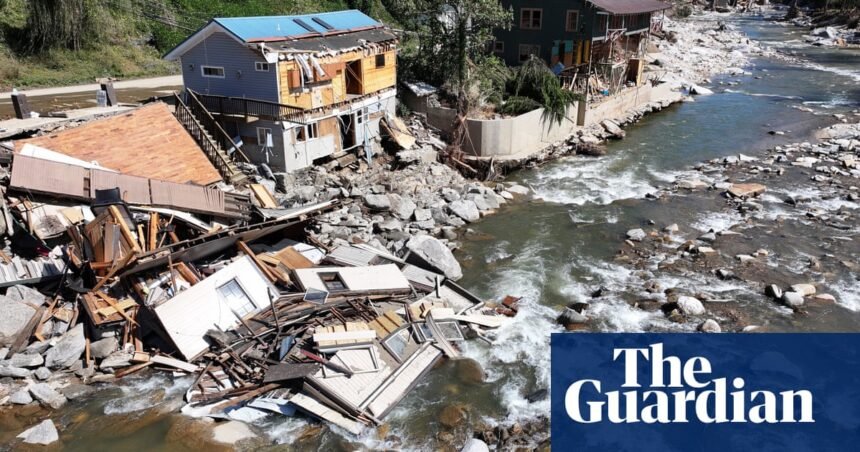As Hurricane Milton approaches Florida, intensified by the unusually warm Gulf of Mexico, a recent analysis reveals that the heat contributing to the severity of last month’s Hurricane Helene was 200 to 500 times more likely due to human-induced climate change. Helene, among the deadliest storms in U.S. history, intensified over the Gulf before making landfall with 140 mph winds.
The analysis indicates that climate change increased the hurricane’s rainfall by 10%, resulting in over 220 fatalities across six states as it continued north two weeks ago, devastating towns, destroying roads, and disrupting water supplies. Furthermore, climate change intensified Helene’s winds by approximately 13 mph, or 11%. According to a multinational team from the World Weather Attribution group, the burning of fossil fuels has made storms as severe as Hurricane Helene about 2.5 times more likely than in the pre-industrial era. If global temperatures rise by 2°C above pre-industrial levels without significant emission reductions, storms like Helene could see an additional 10% increase in rainfall.
Bernadette Woods Placky, chief meteorologist at Climate Central, part of the attribution group, described how human activities are heating the atmosphere and oceans, likening this effect to “steroids for hurricanes.” A Climate Central study published on Monday found that the sea surface temperature along Milton’s path is 400-800 times more likely as a result of the climate crisis.
Placky warned that continued climate warming will lead to the rapid transformation of storms into powerful hurricanes, escalating destruction. The quick assessment of Hurricane Helene comes ahead of Milton’s imminent landfall, which has also strengthened significantly over the Gulf, astonishing scientists by increasing from a category one to a category five storm with maximum winds of 180 mph in just nine hours. Milton is predicted to strike the Tampa area late Wednesday, with local officials issuing urgent evacuation orders.
Both hurricanes rapidly intensified as they passed over the Gulf, with experts attributing this growth to exceptionally warm seawater; recent temperatures in the Gulf have reached record highs, with Milton forecast to traverse waters near Tampa that are 2-3°C warmer than average.
Hurricanes derive power from warmer oceans and atmospheric heat, which not only quickens their progression but also enables them to carry more moisture, resulting in heavy rainfall that can cause widespread flooding, such as that which affected areas as far inland as western North Carolina during Helene’s impact. Brian McNoldy, a climate scientist at the University of Miami, emphasized that the high temperatures in the Gulf create conditions conducive to the rapid intensification of hurricanes.
While factors like wind shear also influence storm development, the prolonged high temperature of the Gulf is raising concerns about the potential for storms like Helene and Milton. McNoldy mentioned the anxiety surrounding the possibility of a hurricane exploiting the elevated heat levels, describing the current situation as a “powder keg, waiting for a spark,” which Milton has ignited with its extraordinary intensification rate.
Scientists highlighted that a warmer atmosphere can retain more water vapor—approximately 7% more for each degree of warming. Currently, the global temperature has risen by at least 1.3°C since pre-industrial times, with concerns that this may be increasing. Katharine Hayhoe, chief scientist of the Nature Conservancy, noted that only 1% of the additional heat from climate change enters the atmosphere, with 89% absorbed by the oceans, leading to rising sea levels, deadly marine heatwaves, and increasingly intense hurricanes.
As these twin hurricanes emerge just a month before a U.S. presidential election where the climate crisis has received minimal focus, they serve as a potent reminder of the impacts of a warming planet, affecting countless aspects of life. Donald Trump, who has dismissed the climate crisis as a “hoax,” had to cancel a Miami appearance due to the hurricane’s effects. His opponent, Kamala Harris, has recognized the threats posed by climate change but has largely avoided emphasizing it in her campaign.
Kathie Dello, North Carolina’s state climatologist, reflected on the connections voters are making as they witness unprecedented climate impacts. She stated, “Climate change is in our face right now,” stressing the vulnerabilities exposed by these disasters. While climate issues seldom top election agendas, the economic consequences of hurricanes—like school closures and food and water shortages—are a direct result of climate change. The UN has indicated that stopping fossil fuel consumption is crucial, asserting that “our future is in our hands.”





